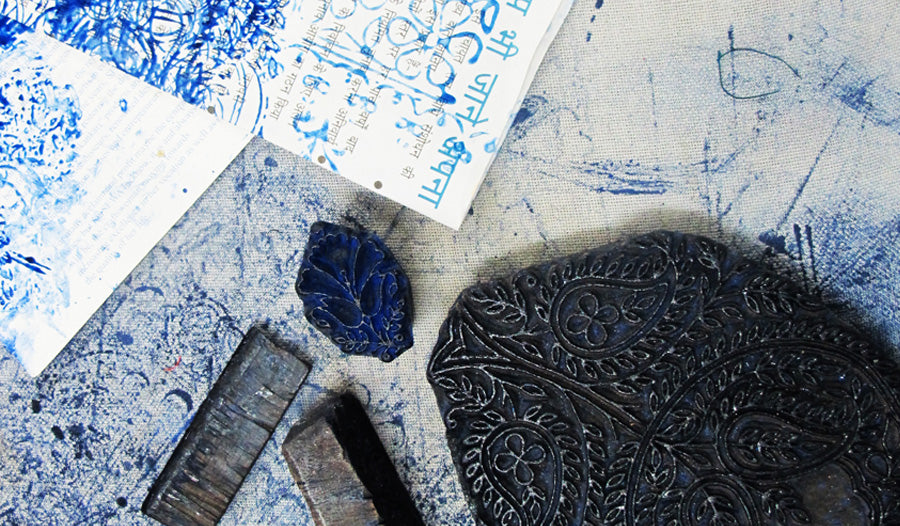
The Khadi Spirit
 Image: Courtesy of Khadi and Co
Image: Courtesy of Khadi and Co
Khadi is a hand spun and hand woven fabric. Made and worn in rural homes, khadi became the symbol of India’s freedom struggle; and in Gandhi’s own words, “the spirit” of Swadeshi, a movement promoting Indian goods he started in 1918. Gandhi announced the Non-Cooperation Movement in August 1920, a nonviolent resistance to British rule that called for the boycott of all foreign products, including foreign clothes. He urged every household, rich or poor, in rural and urban communities to start spinning and weaving their own cloth at home. He set the example, wearing only khadi and spinning yarn on his charkha (spinning wheel). By choosing the humble white khadi over imported garments, Gandhi sent a strong political, social and cultural message to the people. On the path leading towards Swaraj (Self Rule) khadi symbolized, among many ideas, self-employment, self-reliance, political independence, national unity and ultimately, freedom.
When she founded Khadi and Co in 2004, Danish designer Bess Nielsen wished to convey the true spirit of khadi, and promote the remarkable skills of Indian weavers. She first traveled to India in 1976, when she was working as a freelance stylist in the fashion industry. She felt at home immediately, fascinated by a culture where textiles played a vital role in everyday life. She met with textile artisans, weavers and embroiderers, and discovered khadi.
 Image: The Khadi and Co dress that readers can win as part of our Issue 102 Mend competitions
Image: The Khadi and Co dress that readers can win as part of our Issue 102 Mend competitions
Khadi and Co is Bess’s personal project. “I’m deeply moved by Gandhi’s message. Hand spinning has become such a rare thing. The philosophy of khadi is still on people’s minds, but more like a sporadic need to go back to the basics of the Freedom Movement.” The Khadi and Village Industries Commission Act was passed in 1956, keeping the Khadi industry under strict government control. The KVIC’s mission was to promote khadi and to provide employment in rural communities. Khadi is mostly available in Khadi Bhandars (Khadi Emporium), the sales outlets owned and run by the government. Bess Nielsen describes herself as a pioneer who introduced khadi to France. She was indeed the first foreign designer to export: “it took me ten years, with the help of a former government official, to figure out a way to produce khadi as a non-Indian private company, and then to set up the whole production process with the weavers.”
The designer has settled down in Paris but often travels to India to meet with workers. She buys the yearly production of two different villages. Cotton and silk fabrics are made in West Bengal and pashmina is produced in Northern India. The techniques used in handcrafted textiles have barely changed in the past five thousand years. The cotton is locally grown and the silk is locally harvested. A weaver, Bess has immense respect for the skills of the artisans. Handmade textiles are a slow, labour intensive process, so production costs are high. She runs a sustainable company and knows buying khadi at a fair price is the right thing to do, so “little girls can be sent to school. I need to know the spinners and weavers live and work in good conditions.”

Traditionally, home spinning is a woman’s activity. The hand spun yarn and the weaving techniques give “air and flexibility to the cloth, that keeps you warm in winter and cool in summer.” The weavers are usually men; they work on pit looms, Jacquard looms or frame looms, depending on the regions of India. Weaving is often a family affair and several family members can work on the same fabric at home.
Small weaving defects will give khadi its beauty and appeal. Once the weaving is completed, men do the washing and the finishing. The woven fabrics are then delivered to Bess’s workshop near New Delhi.
India has a long-standing tradition of using natural indigo dyes. Bess fondly remembers her denim jeans bled onto her skin when she was a kid in Copenhagen. “My father tied them to our sailboat, hoping sea salt would help the colour to settle. When I first saw the indigo vats in India, I was so disappointed. The fermentation process produced a foul smell and the bronze bubbles on the surface looked so strange. It wasn’t very appealing. I did hesitate, briefly considering synthetic dyes. But then I watched the indigo craftsmen at work. Their blue hands simply rang true. I knew then I would work with natural indigo dyes. To this day, indigo reminds me of the North Sea....”
Extract from the article, The Khadi Spirit, written by Anne Laura Camilleri in Issue 55 Treasure.
We are delighted to have one dress to give away as part of our Issue 102 Mend competitions. Featuring handmade cloth buttons, a collar, anad side seam pockets, the undyed, subtly checked dress will easily take you from day to evenings: Enter here to win
